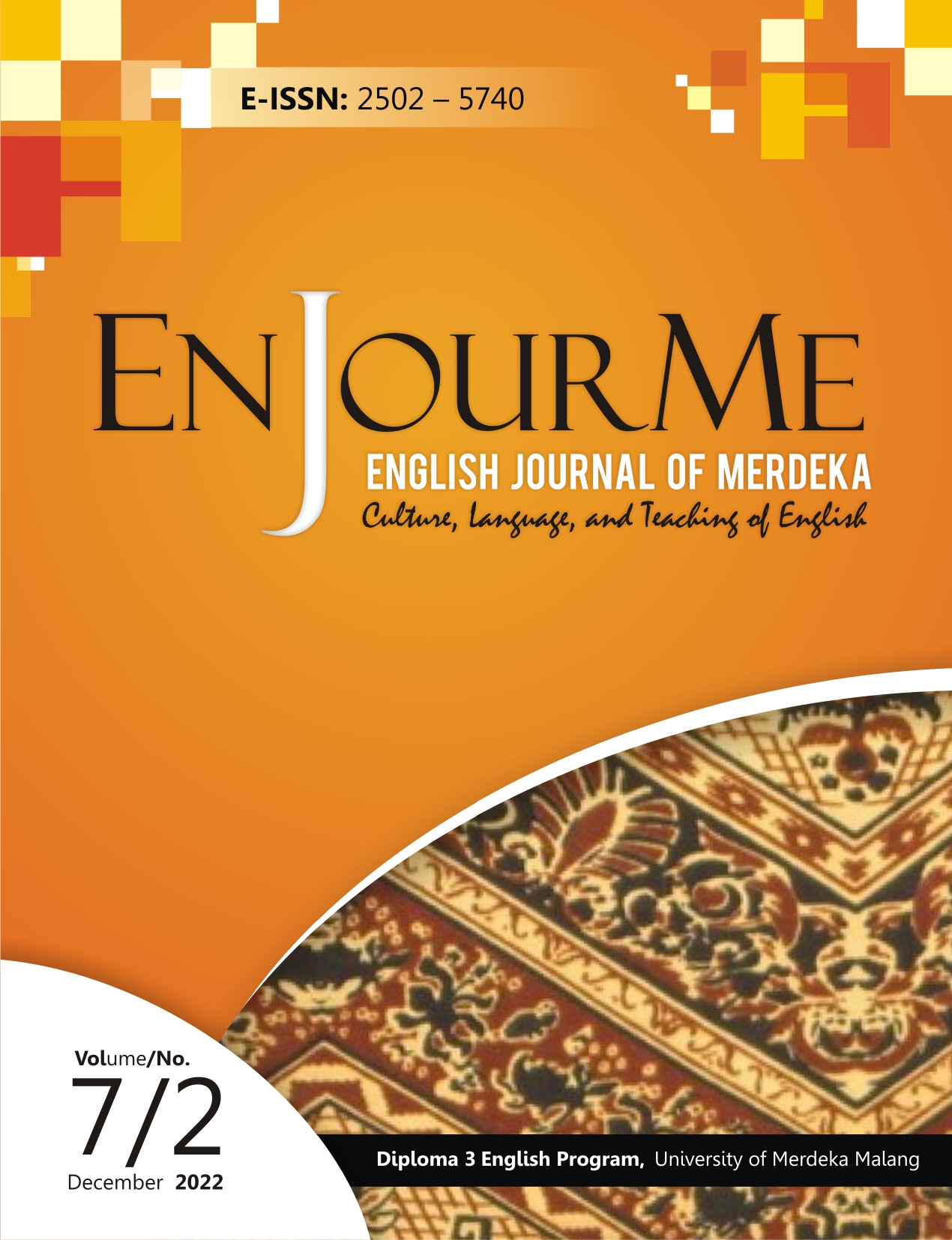Plagiarism in EFL Academic Writing: Students' self-reported reasons for internet plagiarism
DOI:
https://doi.org/10.26905/enjourme.v7i2.8640Keywords:
Academic fraud, internet plagiarism, plagiarismAbstract
Studies show that students who cheat at certain levels of education are more likely to do so at work or at later levels of education. One form of academic fraud is plagiarism. Some researchers claim that students deliberately plagiarize, while others plagiarize because they do not understand how to properly cite, paraphrase, or refer to sources. Therefore, this study aims to understand English as a Foreign Language (EFL) students' self-reported reason for internet plagiarism in Academic Writing class, as understanding the causes of student plagiarism is essential to properly addressing the problem. To obtain the data, a survey of respondents' reason for plagiarize was distributed to second, fourth and sixth trimester students of the Department of English in a private university. A total of 85 students participated in the survey. As a result, we found that some people, despite having a high level of understanding of plagiarism, admitted to intentionally plagiarizing for various reasons. Additionally, research shows that people do not understand that claiming work from a source as their own without acknowledging the source is part of plagiarism.
DOI:Â 10.26905/enjourme.v7i2.8640
Downloads
References
Al Darwish, S., & Sadeqi, A. A. (2016). Reasons for college students to plagiarize in EFL Writing: Students’ motivation to pass. International Education Studies, 9(9), 99–110. https://doi.org/http://dx.doi.org/10.5539/ies.v9n9p99
Ballantine, J., Guo, X., & Larres, P. (2015). Psychometric evaluation of the Student Authorship Questionnaire: A confirmatory factor analysis approach. Studies in Higher Education, 40(4), 596–609. https://doi.org/10.1080/03075079.2013.835910
Ballantine, J., & Larres, P. M. (2012). Perceptions of authorial identity in Academic Writing among undergraduate Accounting students: Implications for unintentional plagiarism. Accounting Education, 21(3), 289–306. https://doi.org/10.1080/09639284.2011.650452
Batane, T. (2010). Turning to Turnitin to fight plagiarism among university students. Journal of Educational Technology & Society, 13(2), 1–12.
Bennett, R. (2005). Factors associated with student plagiarism in a postâ€1992 university. Assessment & Evaluation in Higher Education, 30(2), 137–162. https://doi.org/https://doi.org/10.1080/0260293042000264244
Bretag, T. (2016). Defining academic integrity: International perspectives – Introduction. In T. Bretag (Ed.), Handbook of Academic Integrity (pp. 3–5). Springer. https://doi.org/10.1007/978-981-287-098-8_1
Buckley, E., & Cowap, L. (2013). An evaluation of the use of Turnitin for electronic submission and marking and as a formative feedback tool from an educator’s perspective. British Journal of Educational Technology, 44(4), 562–570. https://doi.org/https://doi.org/10.1111/bjet.12054
Elander, J., Pittam, G., Lusher, J., Fox, P., & Payne, N. (2010). Evaluation of an intervention to help students avoid unintentional plagiarism by improving their authorial identity. Assessment and Evaluation in Higher Education, 35(2), 157–171. https://doi.org/10.1080/02602930802687745
Howard, R. M. (2007). Understanding “internet plagiarism.†Computers and Composition, 24(1), 3–15. https://doi.org/https://doi.org/10.1016/j.compcom.2006.12.005
Ison, D. C. (2015). The influence of the Internet on plagiarism among doctoral dissertations: An empirical study. Journal of Academic Ethics, 13(2), 151–166. https://doi.org/https://doi.org/10.1007/s10805-015-9233-7
Jones, D. L. R. (2011). Academic dishonesty: Are more students cheating? Business Communication Quarterly, 74(2), 141–150. https://doi.org/10.1177/1080569911404059
Jurdi, R., Hage, H. S., & Chow, H. P. H. (2011). Academic dishonesty in the Canadian classroom: Behaviours of a sample of university students. Canadian Journal of Higher Education, 41(3), 1–35. https://doi.org/https://doi.org/10.1007/s10734-006-9047-z
Khathayut, P., & Walker-Gleaves, C. (2021). Academic faculty conceptualisation and understanding of plagiarism–a Thai university exploratory study. Journal of Further and Higher Education, 45(4), 558–572. https://doi.org/https://doi.org/10.1080/0309877X.2020.1795093
Ng, Y.-M., & Yip, C.-W. (2019). A 3-step teaching approach for a blended learning of ‘understanding and avoiding unintentional plagiarism.’ In Nurse education in practice (Vol. 41, p. 102643). Elsevier. https://doi.org/https://doi.org/10.1016/j.nepr.2019.102643
Nonis, S., & Swift, C. O. (2001). An examination of the relationship between academic dishonesty and workplace dishonesty: A multicampus investigation. Journal of Education for Business, 77(2), 69–77. https://doi.org/10.1080/08832320109599052
Obeid, R., & Hill, D. B. (2017). An intervention designed to reduce plagiarism in a research methods classroom. Teaching of Psychology, 44(2), 155–159. https://doi.org/https://doi.org/10.1177%2F0098628317692620
Park, C. (2003). In other (people’s) words: Plagiarism by university students-literature and lessons. Assessment & Evaluation in Higher Education, 28(5), 471–488. https://doi.org/https://doi.org/10.1080/02602930301677
Pino, N. W., & Smith, W. L. (2003). College students and academic dishonesty. College Student Journal, 37(4), 490–500. https://doi.org/https://doi.org/10.1006/ceps.2001.1088
Qudsyi, H., Sholeh, A., & Afsari, N. (2018). Upaya untuk mengurangi ketidakjujuran akademik pada mahasiswa melalui peer education. Integritas: Jurnal Antikorupsi, 4(1), 77–100.
Robles, V. C., Rivas, M. R., & Campos, J. A. S. (2020). Study of the reasons for and measures to avoid plagiarism in young students of Education. Profesorado, Revista de CurrÃculum y Formación Del Profesorado, 24(1), 50–74. https://doi.org/https://doi.org/10.30827/profesorado.v24i1.8572
Walker, A. L. (2008). Preventing unintentional plagiarism: A method for strengthening paraphrasing skills. Journal of Instructional Psychology, 35(4).
Additional Files
Published
How to Cite
Issue
Section
License
Authors who publish with this journal agree to the following terms:
(1) Copyright of the published articles will be transferred to the journal as the publisher of the manuscripts. Therefore, the author confirms that the copyright has been managed by the journal.
(2) Publisher of EnJourMe (English Journal of Merdeka) : Culture, Language, and Teaching of English is University of Merdeka Malang.
(3) The copyright follows Creative Commons Attribution–ShareAlike License (CC BY SA): This license allows to Share — copy and redistribute the material in any medium or format, Adapt — remix, transform, and build upon the material, for any purpose, even commercially.




